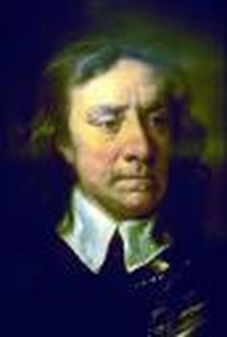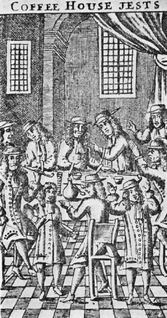 Oliver Cromwell, destroyer of mince pies _I can't say I've ever had mince pie, but I never would have guessed it has such a secretive, mysterious history. Is the mince pie capable of being so subversive that it must be banned? Well, seventeenth-century Puritans thought so. For Cromwell--(the original Grinch? You tell me!)—Christmas represented a time of excessive drinking, gambling, and all around unwholesome merrymaking—all activities that made the Puritans a bit queasy, and decidedly ungodly. So, in 1644, Parliament banned Christmas in England. They renamed the day Christ-Tide (you know, to remove the “papist” overtones of Mass). The hanging of holly and ivy was strictly prohibited. Merchants were advised to keep their stores and stalls open (to avoid sloth and idleness). And if soldiers walking by smelled a goose for supper—well, your goose was cooked. And the poor mince pie? Banned in any public place. Ever since the Crusades, the mince pie had symbolized and honored the birth of Christ. When the Crusaders returned from the Holy Lands, three spices were added to a lamb pie-- cinnamon, cloves and nutmeg--each spice representing the three gifts bestowed upon the Christ child by the Magi. Pies were very small, shaped in the form of a cradle, and eaten throughout the twelve days of Christmas. So to the Puritans, these small pies represented everything that was wrong with Catholicism. Christmas in the American colonies fared no better. The Massachusetts Bay Company General Court ordered that “whosoever shall be found observing any such day as Christmas or the like, either by forbearing of labor, feasting, or any other way, upon any such account as aforesaid, every such person so offending shall pay for every such offence five shilling as a fine to the county." Yikes! Five shillings for every offense—that’s got to add up. However, despite these prohibitions, people continued to make mince pies, calling them “shred” or “secret” pies. (Although calling it a secret pie might have defeated the purpose, but so be it). And for Christmas lovers everywhere, don’t worry. The story ends well. When Charles II was restored to the throne in 1660, the spectacle and merriment of Christmas returned, although it took a little longer in the colonies. And holding a place of honor at the Christmas meal, was the humble mince pie. So, I'm curious--do people still eat mince pie this side of the pond? Or the other side, for that matter? And more interestingly, what other secrets and lost histories lurk within our everyday traditions and customs?
11 Comments
 Given that over the last twenty years I’ve spent much of my free time writing in random coffee shops, I thought today I’d say something about The Vertue of the Coffee Drinke, as described by Anonymous in 1652. Coffee had just become popular in England--and its pretty clear why. To benefit fully from coffee, Anonymous tells us how much to drink ("half a pint"), when to drink it ("fasting an hour before, and not Eating an hour after"), and temperature ("to be taken as hot as possibly can be endured," but not so much as to "fetch the Skin off the Mouth, or raise any Blisters.") (I wish I'd learned this last when I first started drinking coffee; I'm fairly certain I don't have front taste buds anymore). Coffee, Anonymous assures us, is good for digestion (being "of great use to be taken about three or four of the Clock in the afternoon, as well as in the morning), will improve our sight ("being very good against sore eyes") and will give us a nice happy buzz ( it will "very much quicken the Spirits, and make the heart lightsome.") This last point might have something to do with how well coffee "suppresseth fumes exceedingly," but I could be wrong. And WAIT! There's more!!! Coffee will prevail against "the Headache," diminish the "deflusion of Rhemes," (whatever that is), and will even prevent consumption and the cough of the lungs. Coffee will prevent dropsy, gout, the scurvy, any running humors, "hypocondriak windes," and, if you were worried, yes, it will even rid you of the "king's evil." You can have your flu shots, your hospitals, your vitamins, and your vaccinations... But I'm sticking with Anonymous and my daily cup of coffee. I'm sure I'll be fine. What do you think? When I teach history, I always ask my students to view every "fact" as relative and subject to interpretation. Inevitably, someone will ask: "Well, what about dates? Those are facts." But dating and calendar systems vary widely, and may not be consistent across different groups of people.
I've been thinking about this recently as I struggled with the timeline of my own novel. Monster at the Gate begins a few months before the plague struck London in the 1660s. I start the novel on Shrovetuesday in February 1665 (a crazy strange day before Lent) and end with the Fire of London the following year (September 1666). Two clear beginning and ending dates, spanning about nineteenth months in total. Easy enough? NO! As I was writing, I kept running into odd inconsistencies with the historical records I was using (such as Pepys' Diary), trying to double-check details. I kept finding that Tuesdays should have been Sundays, or that Easter had occurred at a different time than I expected. I knew that historical records would say 1664/1665 or 1665/1666, but I couldn't remember the exact details of how contemporaries kept time. (MUCH GNASHING OF TEETH!!!!) Finally, I sorted it out. England was still on the Julian Calendar (which had been adjusted for a missing ten days), rather than moving to the Gregorian Calendar used by most of Europe (it did not reform its calendar until 1752). To make it even more confusing, the Julian Calendar year starts on March 26, not January 1. But luckily I found a historic date calculator to help me keep it all straight. So, my book technically starts on Feb 7 1664, and ends September 3, 1666, and that's still only nineteenth months. You do the math! But I'm wondering if it will confuse my readers if they think the book is starting in 1664, when by today's modern calendar, it would actually be 1665. What do you think? |
Susanna CalkinsHistorian. Mystery writer. Researcher. Teacher. Occasional blogger. Categories
All
Archives
May 2023
|
 RSS Feed
RSS Feed